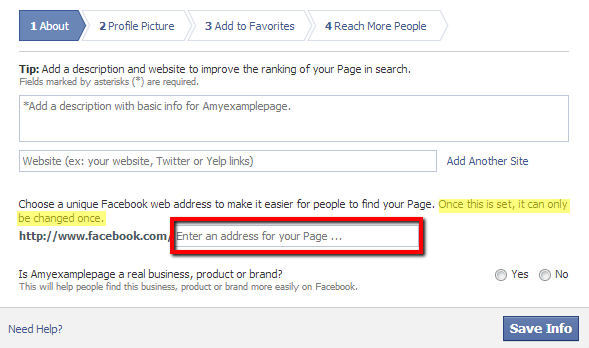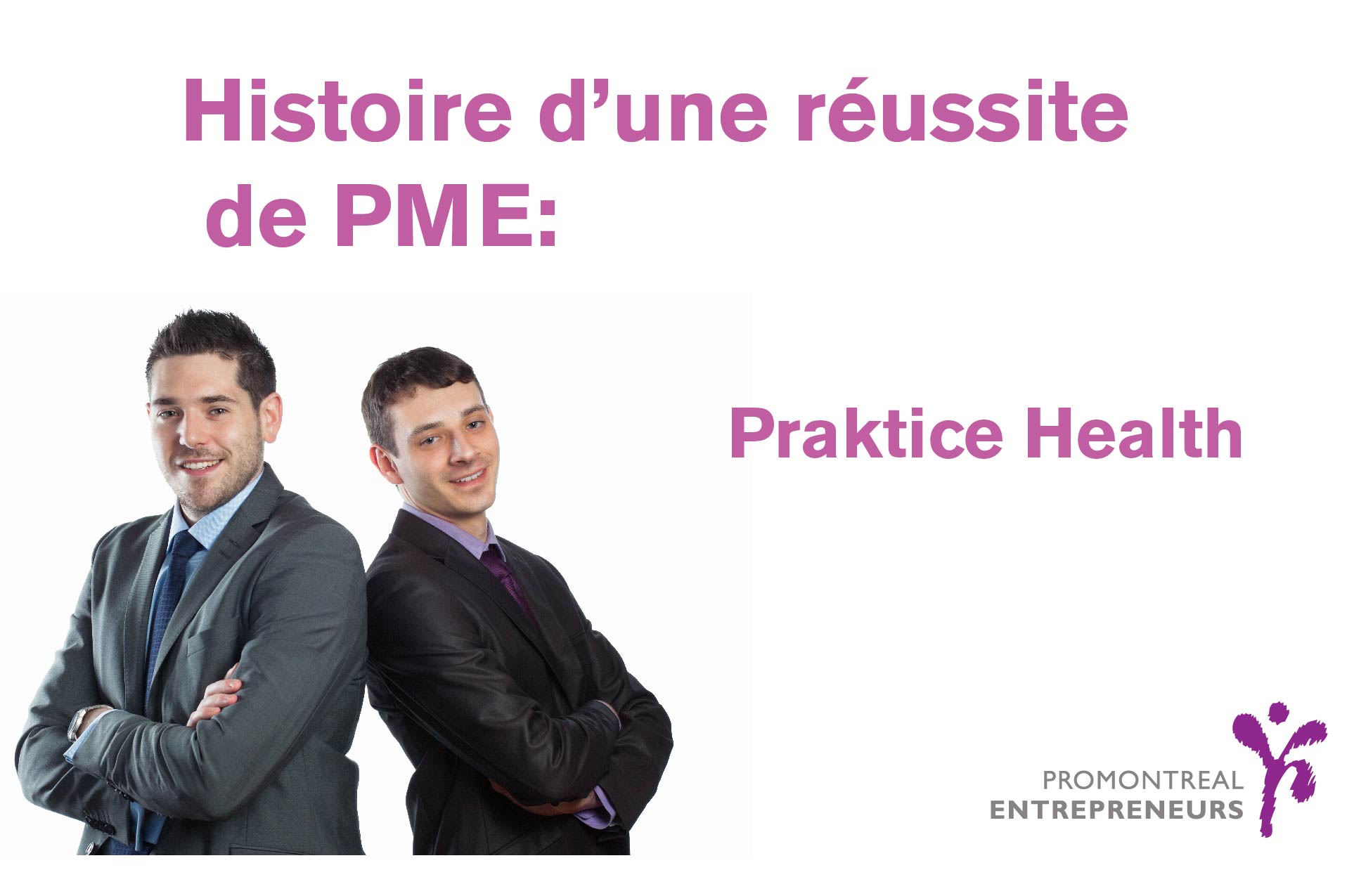 Michael Moszberg faisait partie de la série de financement de PME en 2014. En tant que cofondateur et chef de la direction de Praktice Health, il a constaté des lacunes sur le marché en matière d’activités de bien-être, en particulier pour les entreprises. Lors du démarrage de son entreprise, M. Moszberg a eu recours à un grand nombre de programmes d’accélération et de ressources accessibles aux entrepreneurs au Québec. Il nous donne quelques renseignements et conseils importants tirés de son expérience au sein de programmes d’accélération à Montréal. Ce qu’il changerait et des endroits où les entrepreneurs peuvent trouver de l’aide à Montréal.
Michael Moszberg faisait partie de la série de financement de PME en 2014. En tant que cofondateur et chef de la direction de Praktice Health, il a constaté des lacunes sur le marché en matière d’activités de bien-être, en particulier pour les entreprises. Lors du démarrage de son entreprise, M. Moszberg a eu recours à un grand nombre de programmes d’accélération et de ressources accessibles aux entrepreneurs au Québec. Il nous donne quelques renseignements et conseils importants tirés de son expérience au sein de programmes d’accélération à Montréal. Ce qu’il changerait et des endroits où les entrepreneurs peuvent trouver de l’aide à Montréal.
Q: D’où vous est venue l’idée de démarrer Praktice Health?
R: Lorsque nous avons commencé à parler avec des gestionnaires RH des activités de bien-être pour entreprises, nous avons découvert qu’ils cherchaient des solutions modernes et variées, mais qu’il n’y en avait pas à leur disposition. Après avoir cherché l’activité la plus intéressante qui soit, nous avons constaté que le véritable problème était le manque de participation aux activités de bien-être. Les gestionnaires RH n’avaient pas d’options pour intégrer des activités de bien-être.
Q: Comment avez-vous réussi à vous différencier des autres programmes et applications de conditionnement physique offerts?
R: Il y a beaucoup de choix pour les consommateurs, mais rien pour les entreprises. Ces dernières ont surtout besoin de fonctions comme la planification, les communications, l’administration, l’analytique, les sondages, les photos. Le programme doit aussi être confidentiel et sécurisé. Les grandes entreprises veulent être en mesure d’obtenir des analyses selon les différents départements, et il n’y a rien de la sorte pour les grandes entreprises. Les programmes disponibles nécessitent des ententes annuelles coûteuses, qui absorbent la totalité des budgets de bien-être. Vous avez ensuite les applications qui ne sont ni confidentielles, ni sécurisées, et qui ne comportent pas d’options applicables aux RH.
Q: Vous avez participé à de nombreux programmes d’accélération au fil des ans. Selon vous, quels sont les avantages et désavantages de ces programmes?
R: Je crois que le plus gros avantage des accélérateurs est également le plus gros désavantage. L’aspect le plus important est l’aspect communautaire. Qu’il s’agisse de District 3, de McGill ou de FounderFuel, tous offrent un certain degré de collaboration communautaire, qui peut consister en des conseillers, des collègues ou des pairs. Je crois que c’est une bonne chose, au début, d’avoir recours à un accélérateur, mais après un certain temps, vous devez vous concentrer sur votre entreprise. Le fait d’avoir trop d’événements et trop de personnes autour de vous peut devenir une distraction.
Q: Selon votre expérience, quels aspects du processus des incubateurs/accélérateurs changeriez-vous?
R: Les incubateurs/accélérateurs veulent aider tellement d’entreprises qu’il devient difficile pour eux d’accorder une attention particulière à chacune d’elle. La majorité des incubateurs suivent le même modèle, c’est-à-dire qu’ils présentent l’information générale et veulent que l’entreprise se démarque. Mais seulement une sur dix y arrive. S’ils avaient les ressources leur permettant d’accorder plus d’attention à chacune des entreprises, leur taux de succès serait probablement plus élevé. Mais ils sont limités par les ressources. Ce dont ils ont besoin, c’est davantage de ressources.
Q: Qu’avez-vous acquis de plus précieux dans votre expérience des divers incubateurs?
R: La diversité des conseillers est ce que j’ai acquis de plus précieux au fil des ans. Le problème en ce qui a trait aux mentors, c’est qu’il est difficile d’en trouver un qui est bon pour vous sur tous les plans. Je crois qu’il faudrait en avoir un qui en bon en vente, un qui est bon en TI, un autre en collecte de fonds, etc. Aucun mentor n’est parfait pour toutes les entreprises. Il est important d’avoir un groupe diversifié de mentors.
Q: Quels sont les meilleurs endroits pour trouver des ressources à Montréal, qu’il s’agisse de ressources financières ou de simples conseils?
R: Chaque incubateur est unique. District 3 fournit des espaces de travail gratuits et accompagne les entrepreneurs du point zéro au démarrage de leur entreprise. McGill possède un bon réseau d’anciens ainsi qu’une bonne équipe. The McGill Dobson Cup est un moyen fantastique pour les entrepreneurs qui veulent obtenir des fonds tout au début du processus. Il y a ensuite FounderFuel, qui est un très bon accélérateur d’entreprise. Cependant, si vous vous joignez trop tôt à FounderFuel, vous n’arriverez pas à obtenir cette accélération. Vous devez être arrivé à un certain niveau pour que le programme d’accélération de FounderFuel vous soit utile. Beaucoup de gens ne se rendent pas compte du temps qu’il faut pour démarrer une entreprise. Bien entendu, PME (Pro-Montréal Entrepreneurs) est aussi une ressource formidable. Somme toute, District 3 et McGill sont bons pour le démarrage d’entreprise. Pour obtenir un soutien complémentaire, il y a ensuite des organismes comme PME, PME Montréal, SAJE et Angels. Si votre entreprise est mieux établie, FounderFuel et d’autres entreprises semblables peuvent vous aider. Voici donc ma réponse alambiquée. Il faut toute une communauté, et toutes ces ressources enrichissent l’écosystème.
Q: Que pensez-vous de Montréal en tant qu’entrepreneur? L’écosystème favorise-t-il l’entrepreneuriat?
R: Selon moi, Montréal est un endroit fantastique pour démarrer une entreprise, en raison des salaires bas, du talent qu’on y trouve et des crédits d’impôt. Cependant, il est difficile de vendre sur le marché montréalais. Regardez en Israël, par exemple: il y a beaucoup de ressources pour les jeunes entreprises, mais vous ne verrez pas beaucoup d’entreprises qui y feront des ventes. Montréal est un endroit fantastique pour bâtir une entreprise, mais en prévoyant vendre sur le marché mondial.
Q: De quelle manière le programme PME vous a-t-il aidé, vous et votre entreprise?
R: Le programme PME soutient réellement les entrepreneurs. Les conseillers investissent du temps et des efforts pour contribuer au succès de chacune des entreprises.
Voici de très bons conseils de la part d’un entrepreneur qui a démarré son entreprise à Montréal. Montréal a des ressources formidables à offrir. Vous devez savoir lesquelles sont appropriées pour vous à l’étape où vous êtes rendu. Michael a parcouru beaucoup de chemin depuis notre rencontre en 2014. Nous sommes convaincus que le meilleur reste à venir pour Michael et Praktice Health.
ProMontréal Entrepreneurs (PME) est un modèle d’entreprise sociale créé pour aider les jeunes entrepreneurs à bâtir et à renforcer leurs bases d’affaires à Montréal. PME offre la consultation dans l’élaboration d’un plan d’affaires, un réseau de mentors et l’accès à des sources de financement. Les entrepreneurs âgés de 18 à 40 ans peuvent également avoir accès à un capital de départ pouvant atteindre jusqu’à 50 000 $. N’hésitez pas à communiquer avec nous si vous avez des questions.
 On peut présumer sans se tromper que tout le monde aimerait laisser sa marque dans le monde. Qu’il s’agisse d’un impact à l’échelle mondiale ou à plus petite échelle, nous voulons tous qu’on se souvienne de nous. Il en est de même pour les entreprises. À l’ère des médias numériques, il peut sembler que la façon la plus rapide et la plus percutante d’attirer l’attention est de devenir viral. Mais bien que le prestige et le clinquant de la viralité soient tentants, on peut se demander si l’attention à court terme vaut vraiment la peine, compte tenu de la pression à long terme exercée par les attentes ridiculement élevées.
On peut présumer sans se tromper que tout le monde aimerait laisser sa marque dans le monde. Qu’il s’agisse d’un impact à l’échelle mondiale ou à plus petite échelle, nous voulons tous qu’on se souvienne de nous. Il en est de même pour les entreprises. À l’ère des médias numériques, il peut sembler que la façon la plus rapide et la plus percutante d’attirer l’attention est de devenir viral. Mais bien que le prestige et le clinquant de la viralité soient tentants, on peut se demander si l’attention à court terme vaut vraiment la peine, compte tenu de la pression à long terme exercée par les attentes ridiculement élevées.


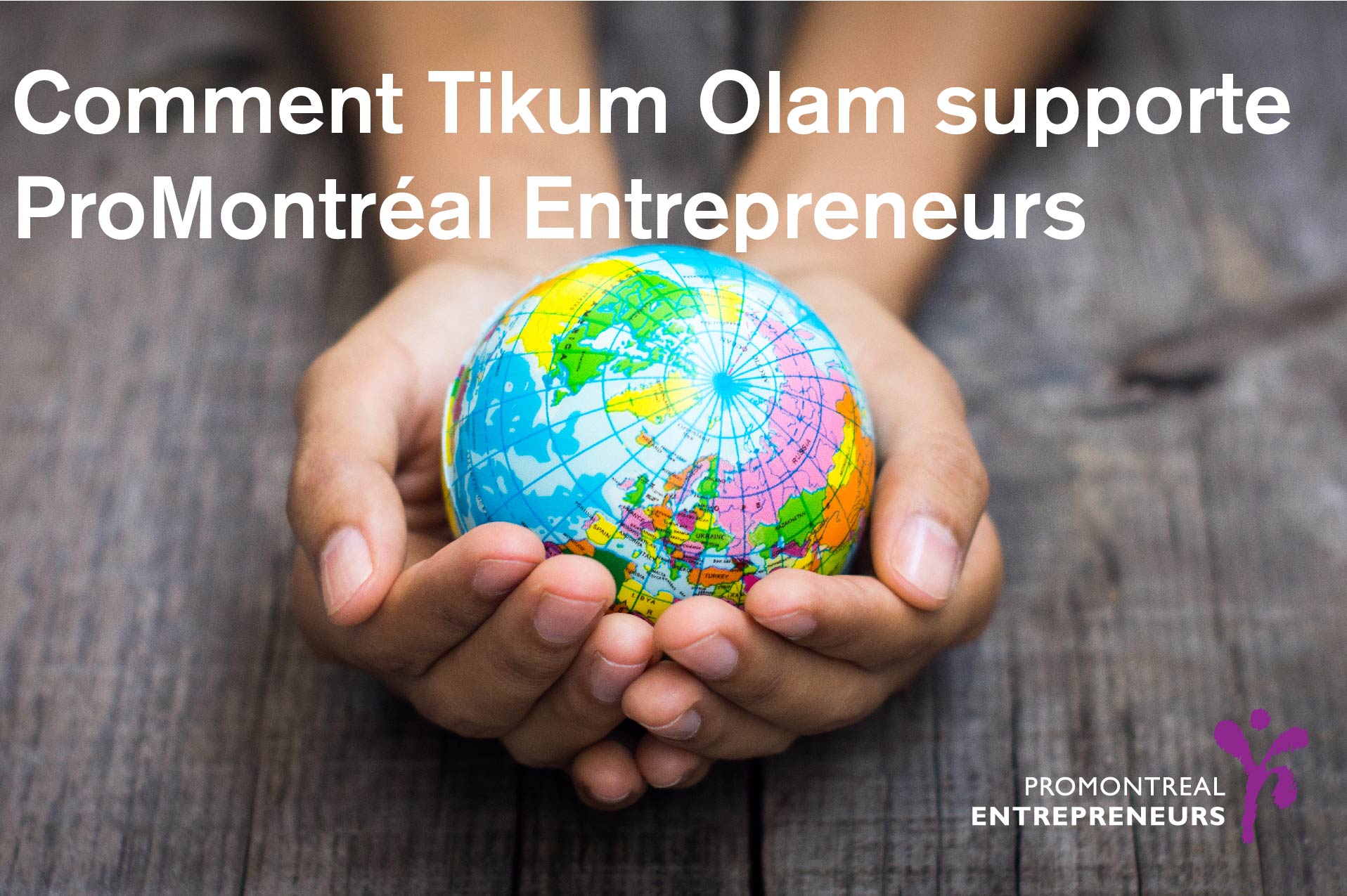 Dans son contexte contemporain Tikun Olam est un concept du judaïsme qui signifie littéralement réparer le monde. Il s’agit d’actes d’intervention sociale qui ont pour objectif de contribuer à rendre le monde meilleur. Tikun Olam est un mantra sur lequel ProMontréal Entrepreneurs se fonde. Par notre modèle d’entreprise sociale, nous voulons non seulement soutenir les entrepreneurs dont les idées contribuent à faire de ce monde un meilleur endroit, nous voulons non seulement mettre de l’avant une approche qui vise à aider les gens à créer leur propre entreprise avec l’objectif d’aider la communauté juive de Montréal, ainsi que la communauté des start-up de Montréal. Dans l’esprit de Tikun Olam, la plupart des jeunes entrepreneurs que nous soutenons démontrent aussi un fort potentiel pour améliorer notre société actuelle.
Dans son contexte contemporain Tikun Olam est un concept du judaïsme qui signifie littéralement réparer le monde. Il s’agit d’actes d’intervention sociale qui ont pour objectif de contribuer à rendre le monde meilleur. Tikun Olam est un mantra sur lequel ProMontréal Entrepreneurs se fonde. Par notre modèle d’entreprise sociale, nous voulons non seulement soutenir les entrepreneurs dont les idées contribuent à faire de ce monde un meilleur endroit, nous voulons non seulement mettre de l’avant une approche qui vise à aider les gens à créer leur propre entreprise avec l’objectif d’aider la communauté juive de Montréal, ainsi que la communauté des start-up de Montréal. Dans l’esprit de Tikun Olam, la plupart des jeunes entrepreneurs que nous soutenons démontrent aussi un fort potentiel pour améliorer notre société actuelle.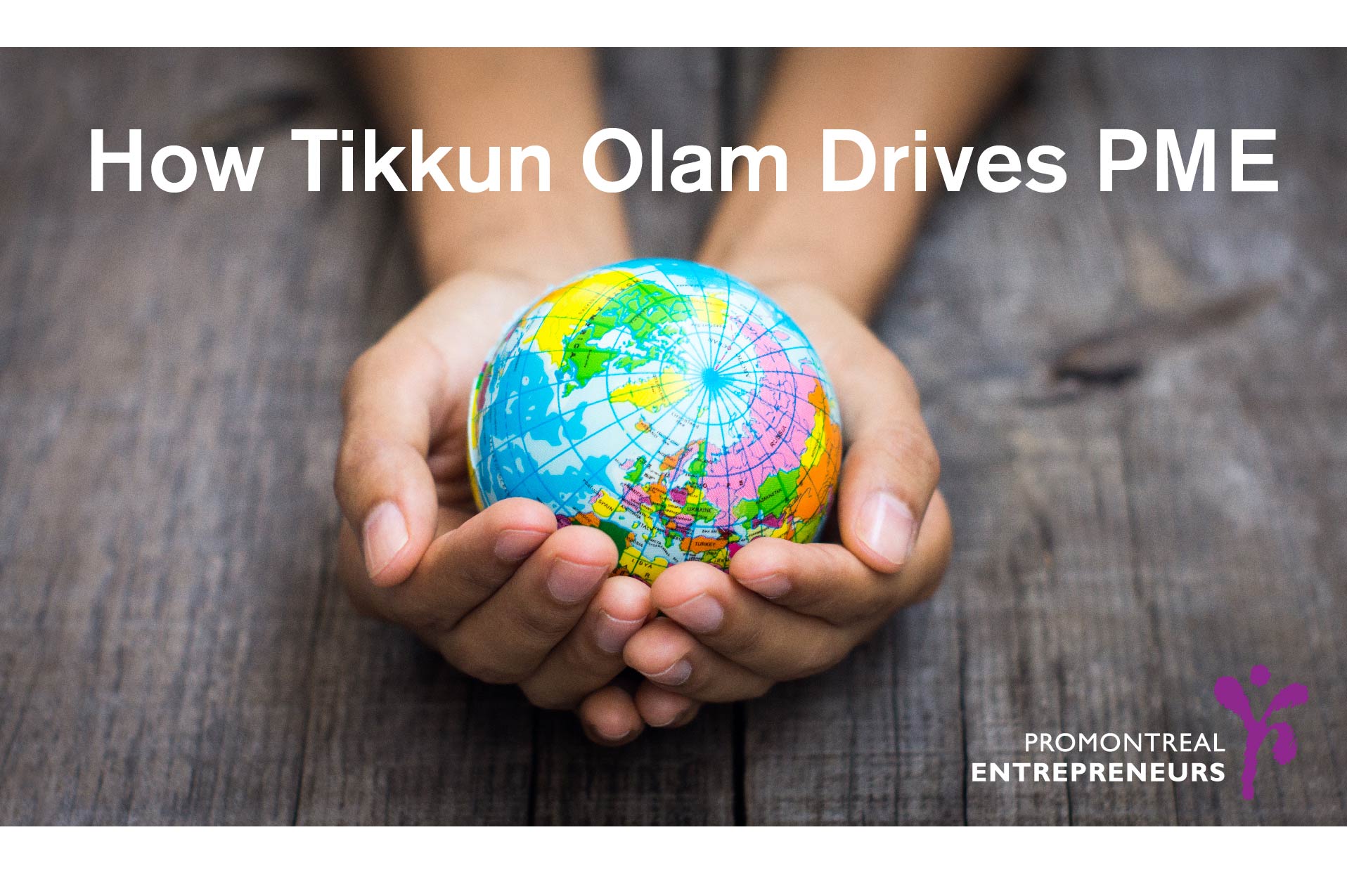 In its contemporary context Tikkun Olam is a concept of Judaism that literally means to repair the world. It is defined as acts of social action that have as a goal to make the world a better place. Tikkun Olam is a mantra that ProMontreal Entrepreneurs strives to base itself on. Through our social business model, we want to support entrepreneurs whose ideas make a real impact in the world.
In its contemporary context Tikkun Olam is a concept of Judaism that literally means to repair the world. It is defined as acts of social action that have as a goal to make the world a better place. Tikkun Olam is a mantra that ProMontreal Entrepreneurs strives to base itself on. Through our social business model, we want to support entrepreneurs whose ideas make a real impact in the world.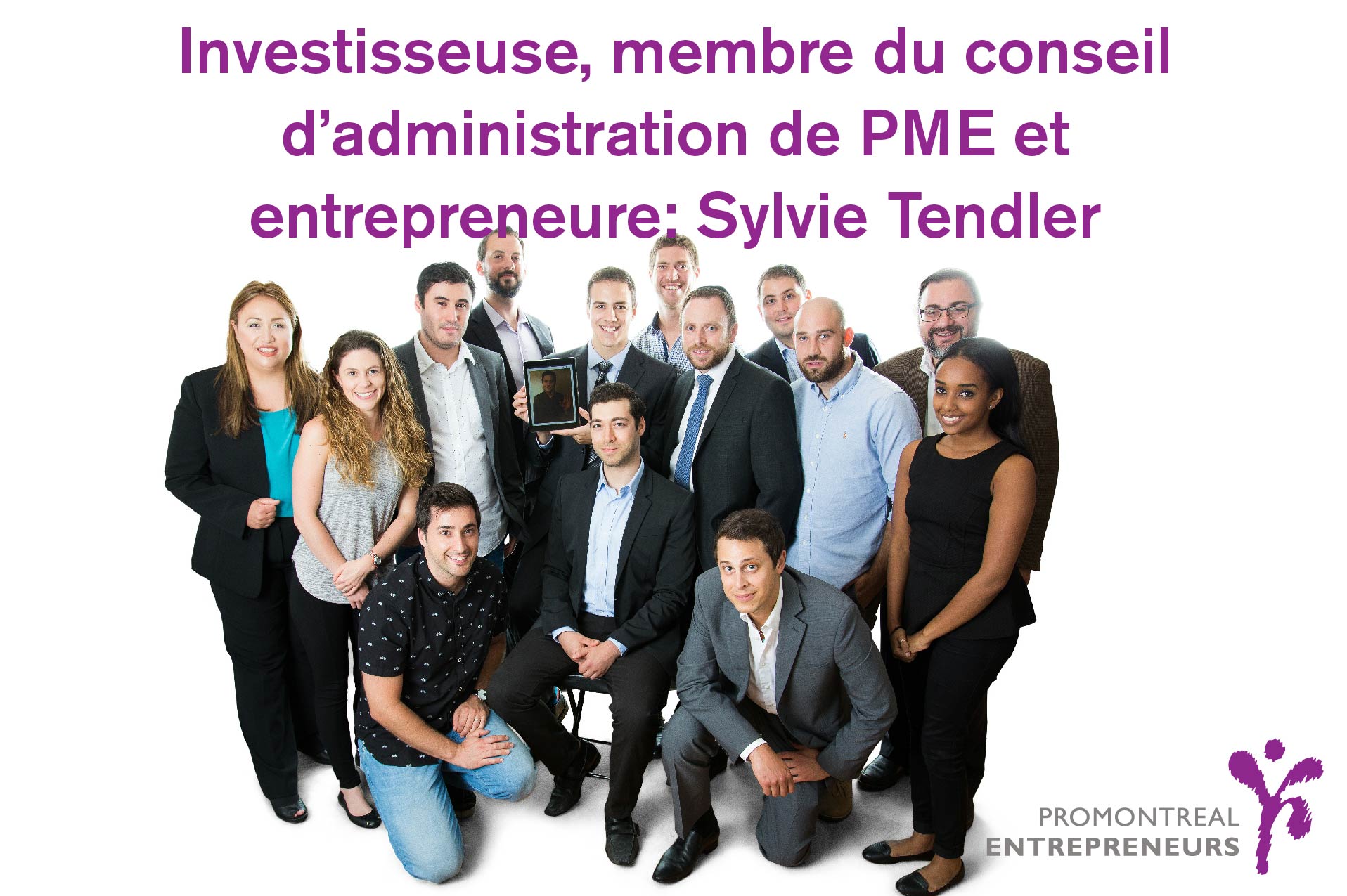 La relation entre Sylvie Tendler et PME (ProMontréal Entrepreneurs) a débuté en 2002, lorsque son entreprise, Groupe Tendler, a reçu du financement. Après plusieurs années de succès et après la vente de son entreprise, Sylvie est maintenant membre de notre conseil d’administration. Sylvie a des renseignements précieux à partager au sujet de l’écosystème montréalais. Par ailleurs, si vous vous êtes déjà demandé ce que les investisseurs recherchent dans une présentation de 15 minutes, cette entrevue vous offrira une perspective remarquable.
La relation entre Sylvie Tendler et PME (ProMontréal Entrepreneurs) a débuté en 2002, lorsque son entreprise, Groupe Tendler, a reçu du financement. Après plusieurs années de succès et après la vente de son entreprise, Sylvie est maintenant membre de notre conseil d’administration. Sylvie a des renseignements précieux à partager au sujet de l’écosystème montréalais. Par ailleurs, si vous vous êtes déjà demandé ce que les investisseurs recherchent dans une présentation de 15 minutes, cette entrevue vous offrira une perspective remarquable.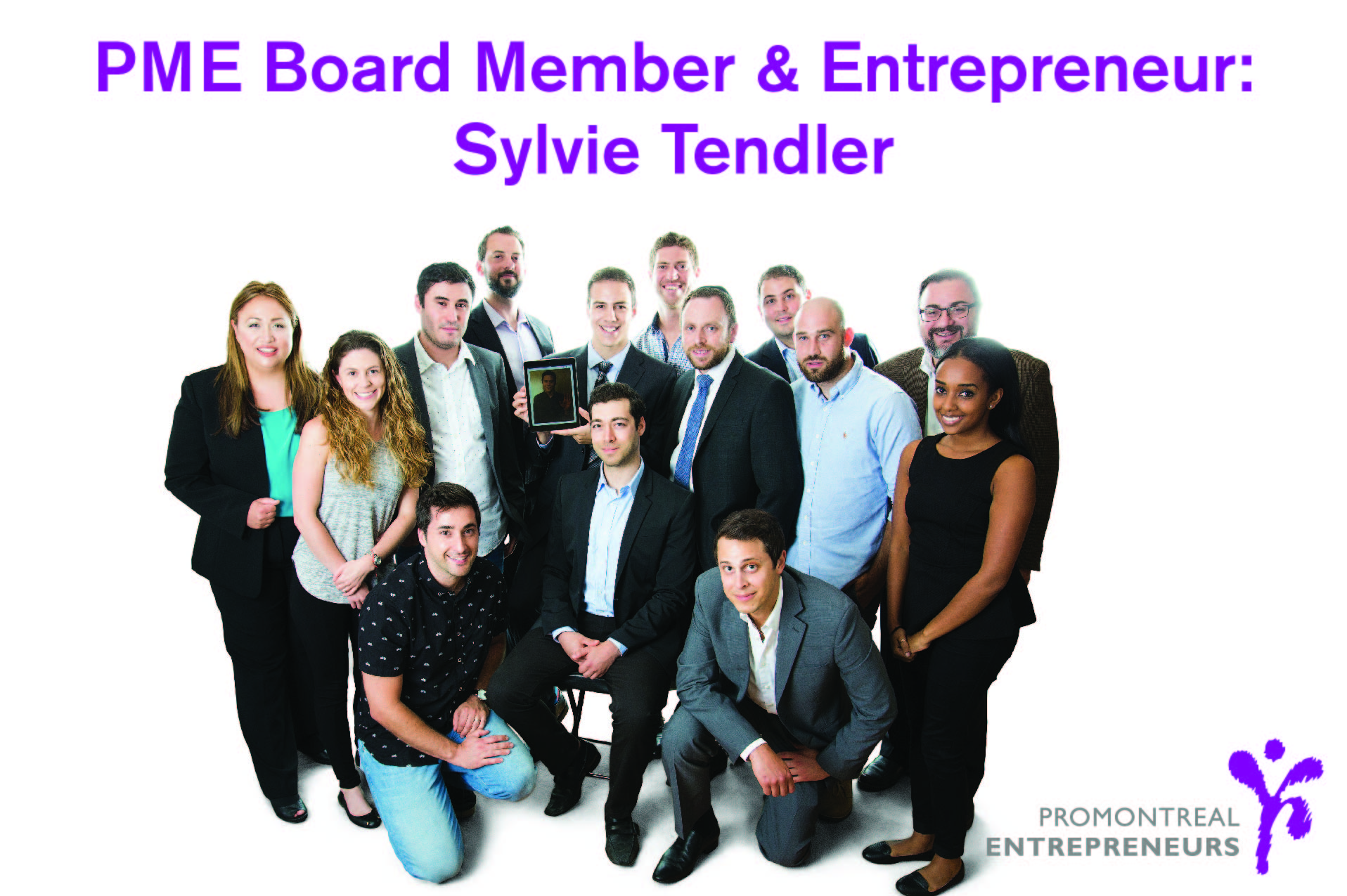 Sylvie Tendler relationship with PME (ProMontreal Entrepreneurs) started back in 2002 when her business, The Tendler Group, was funded. After many years of success and selling her company, she now sits at our Board of Directors. Sylvie has some valuable insight to share about the Montreal eco-system. Also, if you ever wondered what investors are looking for in a 15 minute pitch, this interview will give you great perspective.
Sylvie Tendler relationship with PME (ProMontreal Entrepreneurs) started back in 2002 when her business, The Tendler Group, was funded. After many years of success and selling her company, she now sits at our Board of Directors. Sylvie has some valuable insight to share about the Montreal eco-system. Also, if you ever wondered what investors are looking for in a 15 minute pitch, this interview will give you great perspective.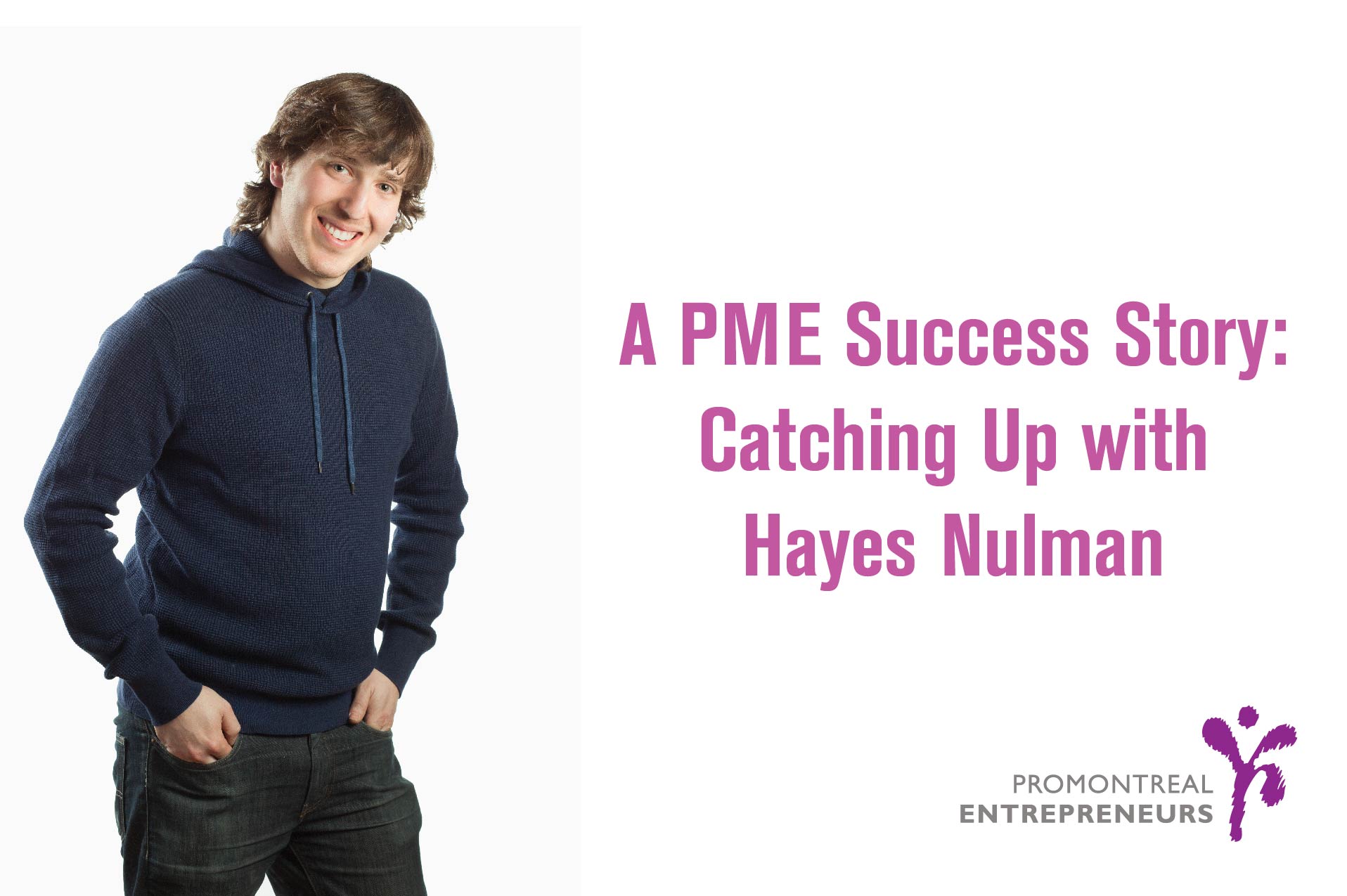 Hayes was part of PME’s 2014 funding round. Still heading operations of his business,
Hayes was part of PME’s 2014 funding round. Still heading operations of his business, 
 Michael Moszberg faisait partie de la série de financement de PME en 2014. En tant que cofondateur et chef de la direction de
Michael Moszberg faisait partie de la série de financement de PME en 2014. En tant que cofondateur et chef de la direction de  Michael Moszberg was part of the 2014 PME funding round. As the Co-Founder and CEO of
Michael Moszberg was part of the 2014 PME funding round. As the Co-Founder and CEO of 

